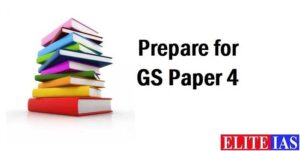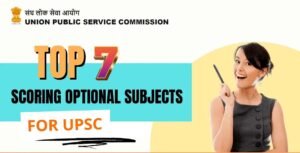
Without adequate training in critical thinking, candidates might fail to build the confidence or abilities needed to apply critical thinking across diverse questions and situations in the UPSC CSE exam.
The Union Public Service Commission (UPSC) exam is well-known. It thoroughly tests those who dream of becoming civil servants in India. But it’s not all about memorizing facts. This exam puts a big focus on critical thinking skills.
Critical thinking isn’t just for the classroom of best IAS coaching of Delhi. It’s a major skill that sets apart the achievers in the UPSC exam. This ability to analyze and evaluate information is crucial. It helps candidates stand out in this competitive examination.
Bibhash Sharma, the Director Elite IAS Academy, answers many relevant questions about the relevance of critical thinking in the UPSC examination.
Question 1: What does critical thinking entail, and during which phases of the UPSC examination does it prove to be beneficial?
Bibhash Sharma: Critical thinking is a vital cognitive ability. It’s all about breaking down, combining, and assessing information, ideas, or arguments. This skill transcends the mere collection and recall of data. Instead, it involves a proactive and reflective engagement with the content. It’s crucial at all stages of the UPSC exam, significantly influencing the development of future leaders in administration. The UPSC exam unfolds in three parts: Prelims, Mains, and Interview. Each part tests different critical thinking abilities.
In the Prelims, aspirants face a wide range of multiple-choice questions. These questions check not just their knowledge but also their analytical skills. Critical thinking helps them tackle tricky questions, weed out wrong answers, and make smart choices quickly. Some questions might be vague or have more than one right answer. Here, critical thinking is key to evaluating options and picking the best one.
Moving to the Mains, essay writing is a crucial test of a candidate’s ability to construct logical arguments, dissect complex issues, and understand societal challenges deeply. With critical thinking, aspirants can express their views with clear, precise, and insightful language.
Additionally, the General Studies papers demand an interdisciplinary approach. Critical thinking helps connect different topics. This includes analyzing historical events, deciphering economic trends, and judging policy impacts. It encourages a broad and integrated viewpoint.
The Ethics paper tests how candidates handle ethical dilemmas. They must balance conflicting values and suggest solutions that reflect public service ethics. Critical thinking is essential for this. Finally, the interview phase looks at personality, communication, and analytical skills. Critical thinking shines as candidates tackle situational queries, discuss current affairs, and present thoughtful perspectives on governance and policy. Few online coaching for UPSC also provide such study environment.
Question 2: Why is a critical perspective essential for achieving success in the UPSC Civil Services Exam?
Bibhash Sharma: In the UPSC Civil Services Exam, aspirants often face the challenge of dissecting intricate problems. They need to assess various policy choices and offer viable solutions. Honing sharp analytical skills is key for them to tackle the broad and complex issues that arise in the exam. Civil servants regularly encounter decisions in fast-changing and complicated scenarios. A critical perspective aids in evaluating the outcomes of different decisions. It encourages looking at issues from various perspectives and making choices based on thorough understanding. This ability is vital for roles in administration and policy formulation that successful aspirants will undertake.
Having a critical viewpoint is indispensable for grasping the socio-political intricacies of a diverse and layered society like India. It entails challenging presuppositions, identifying prejudices, and acknowledging the complexity of problems. Such depth of understanding is vital for crafting policies that are inclusive and effective. It equips candidates with the agility to adapt to evolving conditions, scrutinize established norms, and introduce groundbreaking solutions. Moreover, it assists them in handling ethical quandaries, guaranteeing that their decisions reflect values of justice, fairness, and ethical integrity.
Question 3: Despite critical thinking being a core skill that greatly improves a candidate’s success in the UPSC, why isn’t this ability prominently emphasized in UPSC preparation?
Bibhash Sharma: Some candidates may not grasp the full importance of critical thinking for the UPSC exam. They often view prep as just memorizing data, overlooking analytical skill importance. Furthermore, the UPSC’s broad syllabus, especially for Prelims, can pose time challenges. Candidates might feel the urge to study a vast array of subjects. This rush can leave little room for deep critical analysis.
Often, critical thinking requires evaluating and interpreting data, which can be subjective. Candidates might worry about their views not matching the examiner’s, leading them to shy away from critical analysis. Additionally, many aspirants lack proper guidance on honing critical thinking. Without clear methods or advice, embedding critical thinking in their study plans becomes tough.
Without regular practice in critical thinking, candidates may not gain the necessary confidence or skills. They might find it hard to apply critical thinking to the diverse questions and situations they’ll encounter in the exam.
Question 4: Aspirants must understand the importance of critical thinking in the UPSC exam and its relevance thereafter. Could you recommend particular methods to cultivate this skill?
Bibhash Sharma: Building critical thinking skills is a step-by-step journey. It requires sharpening various mental abilities and fostering a culture of inquiry and analysis. Here are some strategies aspirants can adopt to nurture their critical thinking capabilities:
- Start by cultivating a questioning mindset. Aspirants should actively participate in discussions. They ought to listen carefully to others. It’s important to consider diverse viewpoints and seek to grasp the logic behind different opinions.
- Reading widely is crucial. This includes a variety of articles, books, and scholarly papers. While reading, take detailed notes, highlight essential ideas, and pose questions to yourself.
- Work on articulating your thoughts clearly and systematically. Practice writing essays, evaluating arguments, and expressing your views on different topics.
- Make it a point to explore opinions that challenge your own.
- Have conversations with individuals from varied backgrounds and cultures.
- Evaluate the trustworthiness and validity of the sources you consult.
- Stay aware of your biases and think about the context of the information you receive.
- Regularly take time to reflect on your thinking and decision-making habits.
- Participate in debates or discussions, whether in a formal setting or casually.
- Stand by your views while being receptive to having them questioned.
- Welcome feedback on your reasoning from colleagues, mentors, or educators.
- See constructive criticism as a chance to grow.
- Keep up with current affairs and global topics.
- Critically review news reports, weigh up differing viewpoints, and form your own assessments.
Remember, developing critical thinking is a continuous process that demands patience and dedication. By diligently practicing these methods, one can significantly improve their analytical skills. This approach enables tackling problems and situations with a more analytical and open-minded perspective.
Question 5: Are there specific optional subjects that can improve critical thinking skills?
Bibhash Sharma: Exploring social sciences options like Sociology, Philosophy, Psychology, Political Science, and Economics reveals their foundation in critical thinking. Among these, I believe Sociology stands out for nurturing critical thinking skills right from the start. This assertion is supported by Sociology’s definition itself: a critical and scientific examination of society. Sociology pushes us to challenge both our own and others’ assumptions, offering a lens to view the world critically.
Sociology, in essence, expands our understanding by prompting us to question what we take for granted. It equips us with a critical viewpoint, enabling us to see the world through a different lens. For example, sociological theories serve as tools to comprehend social dynamics. Critical thinking plays a role in assessing these theories, contrasting them, and applying them to understand and decode social issues in real-life contexts.
Sociology courses frequently incorporate debates and discussions on a variety of societal topics. Participating in these conversations demands critical thinking. Students are encouraged to evaluate diverse perspectives, challenge prevailing assumptions, and present well-founded arguments.
Topics such as race, gender, and class are understood as social constructs that influence individual experiences significantly. Sociology promotes a thorough critique of these constructs. It invites students to scrutinize the underlying assumptions and reflect on how these social categories affect people’s lives. This approach underlines the discipline’s commitment to developing a critical mindset among its students.
In conclusion, critical thinking is an indispensable skill for aspirants of the UPSC CSE. It touches every aspect of the examination from Prelims to Mains, and the Interview. Bibhash Sharma’s insights demonstrate how critical thinking not only enriches the preparation process but also prepares candidates for the multifaceted challenges of civil services. By adopting strategies that boost critical thinking, aspirants can elevate their analytical skills. Engaging in a variety of reading materials, actively participating in discussions, and questioning their own views are key. These approaches enable significant enhancement of their analytical capabilities.
You Must Read: Kickstart Your UPSC Preparation with These 5 Strategies
Moreover, selecting optional subjects like Sociology, which inherently foster a critical approach to understanding societal dynamics, can further augment this skill. Ultimately, the journey to becoming a successful civil servant is deeply intertwined with the continuous development of critical thinking, ensuring that future leaders are well-equipped to navigate the complexities of governance and policy-making with discernment, integrity, and a deep understanding of the socio-political landscape of India.
Furthermore, choosing optional subjects such as Sociology, known for encouraging a critical perspective on social dynamics, can enhance this ability. The path to becoming a competent civil servant is closely linked with the ongoing growth of critical thinking skills. This ensures that the leaders of tomorrow are fully prepared to handle the complexity of governance and policymaking. They will do so with clear judgment, ethical standards, and a comprehensive grasp of India’s diverse socio-political environment.




